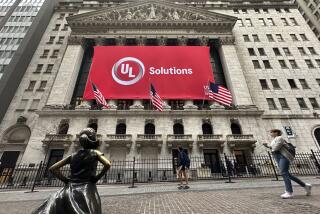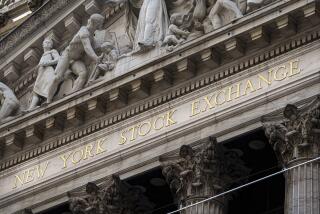European crisis tests investors’ ‘go global’ strategy
For investors, this summer was no European vacation.
Over the last few months the continent’s stock markets suffered their worst plunge since the economic crash of 2008. While U.S. stock mutual funds that track the blue-chip Standard & Poor’s 500 index lost 14% in the third quarter, the average European stock fund sank 23%, according to data firm Lipper Inc.
Americans have become big believers in global investing in the last decade, pumping record sums into foreign stock funds even as they’ve fled many U.S. stock funds. Now, their resolve is being put to the test, as the debt crisis that began in Greece two years ago threatens to engulf Europe’s biggest economies.
Many U.S. investors who own diversified international stock funds, such as through 401(k) retirement savings plans, may not realize how much of their money is invested in Europe. The average diversified foreign fund has about 55% of its assets in Europe, according to Lipper.
Of course, steep declines in many other foreign markets last summer also hurt Americans with money abroad. But Europe’s government-debt crisis remains the most troubling issue facing global markets because of the risk of another full-blown financial meltdown.
The question is whether things can get much worse for European markets before they get better.
The cascade of selling in recent months has been driven by the belief that there is no quick fix for the continent’s fiscal woes, as Greece and other countries find themselves in danger of being crushed by massive debts built up over many decades.
That means European economies and share prices may not recover anytime soon, some warn.
“The next two years may be hell,” said Dean Tenerelli, the London-based manager of the T. Rowe Price European Stock fund. But he believes Europe will enact structural economic reforms and emerge healthier.
U.S. investors appear to be holding their ground: Even after pulling a net $800 million from foreign stock funds last week, they still added more than $2.8 billion to the funds in September, according to industry data.
Meanwhile, some $5.7 billion was siphoned out of domestic stock funds last week, continuing a years-long pattern. Investors have yanked a net $370 billion from domestic funds since 2005, while pouring $415 billion into foreign funds.
Americans have bought into Wall Street’s pitch about the importance of global diversification, and many financial advisors say that’s still a viable long-term investment strategy.
But there’s no way to know how much damage European markets could sustain in the worst-case scenario. The greatest risk is that a default by Greece on its bonds could ripple into other troubled countries, such as Spain, Portugal, Italy and Ireland, and hammer the big banks that own sovereign bonds.
“Until there’s a resolution to the European debt crisis there’s still significant downside, even after this aggressive selling,” said Alec Young, international equity strategist at Standard & Poor’s. “It can get worse.”
Compounding matters for U.S. investors in the third quarter was the euro’s continued slide against the dollar as the debt crisis rattled global markets. The 17-nation euro has plunged to about $1.34 now from $1.45 in late August. The immediate effect is to devalue euro-denominated securities such as stocks.
For example, the German stock market dropped 23% in euro terms over the last three months, but the loss to U.S. investors was 28% counting the effect of a weaker euro. If Europe’s debt crisis continues to drag on the euro, it also will drag on U.S. investors’ returns on European stocks.
Though European firms have seen their stock prices plunge, they could benefit if the euro continues to weaken because a falling euro makes European exports cheaper for foreign buyers.
Companies such as Royal Dutch Shell, GlaxoSmithKline, Nestle and Sanofi all are staples of foreign large-company mutual funds, and all are major exporters.
The long-term bullish argument is that the finances of Europe’s largest corporations are in much better shape than their governments, and the companies have global operations whose fortunes aren’t tied solely to Europe. And the stocks, fund managers say, are cheap. Based on trailing 12-month earnings per share, the price/earnings ratio of the Stoxx Europe 600 index is 9.3, according to FactSet Research Systems Inc. That’s less than half its 19.3 average over the past decade.
“You’re buying a market with global exposure and significant emerging-market exposure,” said Richard Turnill, manager of the BlackRock Global Dividend Income Fund. “There are many high-quality stocks that today are at very attractive valuations.”
Still, a few pros say the European outlook is so grim that investors should consider dumping any funds with exposure to the region, including diversified funds. It could take years for Europe’s economy to right itself, they say, leaving European shares at risk of further sizable losses that would take years to recoup.
Investors who have held their funds for years often are reluctant to break with the buy-and-hold mantra, in part because they want to avoid capital-gains taxes, said David Hefty, head of Hefty Wealth Partners, a financial-planning firm in Auburn, Ind. But it’s better to pay taxes on profits rather than lose a big chunk of principal by holding on, he said.
“I’d sell. Absolutely,” said Hefty, who dumped his European holdings in June. Investors “should not just turn a blind eye and lose money.”
Despite enacting a series of emergency austerity measures, Greece said last week that it would fail to meet deficit-reduction goals for 2011 and 2012. Its economy, already suffering through its third year of recession, continues to worsen.
European authorities have cobbled together two separate rescue packages, but the latest one is mired in political wrangling and many experts fear that governments lack the political will and financial firepower to prevent contagion from hitting other nations — particularly Italy, the third-largest Eurozone economy.
Also, investors worry that even a so-called orderly Greek default, one that is pre-arranged with bondholders, could have unpredictable consequences.
That increases the odds of the continent falling into its second recession in three years, analysts warn.
The International Monetary Fund predicts anemic growth in Europe — 1.6% this year and 1.1% next year — and some private forecasters think that’s too optimistic. Goldman Sachs predicted last week that Europe would fall into a recession this quarter and expand a barely perceptible 0.1% next year, down from its previous expectation of 1.3% growth.
Experts say investors have to decide whether they have a long enough time horizon to look beyond what may be another harrowing period ahead for Europe.
“If you’re that long-term investor and your retirement goal is 20 to 30 years away, there are very few places to hide,” said Jeff Tjornohoj, senior analyst at Lipper. “Rolling with the punches is probably better than staying up all night looking for that untouched pocket in the universe.”






